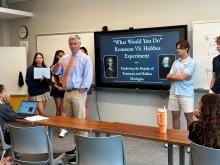
By Adam Rohdie, Head of School
We seem to have forgotten, as a society, how to make the most of difficult conversations. This deficit can be seen on the world stage in political debates, at the dinner party table, and unfortunately, in classrooms across the country. The idea of a Jeffersonian dinner party where friends with differing visions of the world can learn from each other seems to have died. Sadly, it was Jefferson himself who said, “I never considered a difference of opinion in politics, in religion, in philosophy, as cause for withdrawing from a friend.”
At GCDS, we know that differing perspectives on challenging topics can lead to learning opportunities. Yet, throughout our country and in so many different schools, we are increasingly missing those opportunities in our determination to prove ourselves infallible.
By subscribing to the scorched earth policy of not only doggedly defending our opinions as fact, but dismantling any contrary views, we miss the chance to ask good questions and to listen with honest curiosity—we certainly miss any opportunity to evolve in our thinking.
In numerous conversations with Country Day teachers, we have talked about how we must prepare our graduates to change this narrative. This is true when two Kindergarten children have an argument over whether Batman or Superman is the better superhero, or in a high school history class exploring the most recent Supreme Court decision surrounding abortion. As part of our initiative to engage students in this discourse, I am excited to tackle the idea of civil/uncivil discourse in a course I am teaching this year in the Upper School.
Great American Debates: Government, Civics, and Ethics
This course explores the key debates that drive contemporary American politics. Through grappling with ‘ripped-from-the-headlines’ issues of society, rights, and politics, students will analyze the history and structure of American government, the core systems and arguments of American law, and the ethical positions that emerge from these issues. In the process, students will develop the skills of persuasive debate, analytical writing and argumentation, as well as the interpretation of personal ethics. In pursuit of these skills, students will prepare themselves to be active and engaged citizens of America’s diverse and dynamic democratic society.
An informed and engaged citizenry is one willing and able to take on the unique and wonderful, if daunting, promise of our republic, to steer our own ship.
When Ben Franklin was asked after the Constitutional Convention what form of government the delegates had created, his reply was: “A republic, if you can keep it.” And the great American educator John Dewey once said, “Democracy has to be born anew every generation, and education is its midwife.”
This fall we will once again be in the midst of a national election and while I am not optimistic that we will see any campaign that tries to unify our growing fracture, I am optimistic that GCDS will be armed to engage in discussion in a fashion that shows a healthy respect and real desire to learn and grow.
To make the most of the opportunity, our students must build their democracy tool kit. They must learn from and participate in big conversations. They must ask honest, difficult questions, and then patiently listen, open and ready to learn something new. They must build the confidence necessary to reexamine their views and either strengthen them or change them.
If our country is to evolve and move forward, if we are to emerge from November on a path toward unity, we all must build these key skills, we must model for our children what civility looks like and we must embrace the most American ideal, E pluribus unum—“Out of many, one”!








.JPG&command_2=resize&height_2=85)




.jpg&command_2=resize&height_2=85)



.png&command_2=resize&height_2=85)




